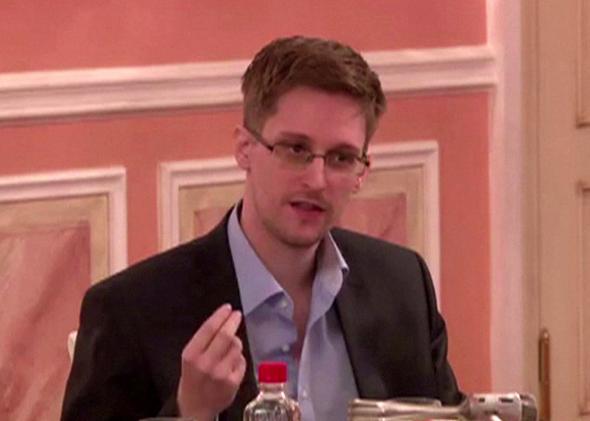This post originally appeared in Business Insider.
Even as Edward Snowden’s disclosures of U.S. spying continue to create global waves, it’s becoming clear that the American’s life is supervised by Russian intelligence agents. “He’s actually surrounded by these people,” Andrei Soldatov, an investigative journalist who co-authored a history of the Russia’s Federal Security Service (FSB), told Steven Lee Meyers of the New York Times.
That has appeared to be the case since the 30-year-old arrived in Moscow from Hong Kong on June 23, when a radio host in Moscow “saw about 20 Russian officials, supposedly FSB agents, in suits, crowding around somebody in a restricted area of the airport,” according to Anna Nemtsova of Foreign Policy. “When the F.S.B. actually got him, they started to handle it their own way,” Soldatov told the Times. “This is the way the security services operate all the time.”
Snowden’s life in Russia has been overseen by Anatoly Kucherena, a lawyer employed by the FSB, as well as Sarah Harrison, a WikiLeaks advisor who has reportedly been by Snowden’s side since he was in China. A Kremlin-linked news agency has posted pictures of Snowden grocery shopping and riding a boat, and Kucherena says that Snowden got a job at an unnamed Russian website. Soldatov and others cautioned to the Times that what the FSB allows for public consumption may present an impression of a happy and free asylum while obscuring ulterior motives for hosting the former CIA technician and NSA-trained hacker.
From Meyer’s report in the Times:
The security services now protecting Mr. Snowden, [Soldatov] said, might not even try to question him soon on what he knows—perhaps the greatest worry of American officials—but rather simply let him live in such circumstances and become increasingly dependent on them.
Lingering questions
The unusual circumstances raise two significant questions. The first involves what the Russians can potentially glean from Snowden. In October he told the Times that “a zero percent chance the Russians or Chinese have received any documents,” referring to the stolen trove of classified NSA documents that he took from Hawaii to Hong Kong. The information includes not only the “blueprints of the NSA” but also 30,000 documents that do “not deal with NSA surveillance but primarily with standard intelligence about other countries’ military capabilities, including weapons systems,” according to a report in the Washington Post.
Snowden claimed to the Times that he gave all of the classified documents to journalists he met in Hong Kong, but there are several holes in that assertion. One of those journalists, Glenn Greenwald, has said that he believes Snowden held back some documents, saying Snowden “was clear he did not want to give to journalists things he did not think should be published.” And following Snowden outing himself on June 9 and subsequently parting with the journalists, he leaked specific IP addresses in China and Hong Kong the NSA was hacking to the South China Morning Post. He also told SCMP: “If I have time to go through this information, I would like to make it available to journalists in each country to make their own assessment.”
No matter how all of the documents left his possession in Hong Kong, Snowden’s ability to pull of the leak of the century means he has an enormous amount of highly valuable information in his head. “Snowden understood exactly how far he could push [the NSA],” Robert Caruso, a former assistant command security manager in the Navy and consultant, told Business Insider in July. “That, coupled with his successful exploitation of our entire vetting process, makes him very dangerous.”
The other lingering question involves the role of WikiLeaks, which facilitated Snowden’s arrival in Moscow and has clearly been coordinating with the FSB since Harrison is by Snowden’s side, the FSB surrounds him, and WikiLeaks arranged for four former U.S. government officials to present him with a whistleblower award in Moscow. Despite those uncertainties, Snowden’s father told the Times that he knew very little about his son’s life in Russia and declined to detail what he did know, did say that the “story isn’t really about him at this point.” The story of the recognized NSA overreach that Snowden’s leaks have exposed certainly is not—but his vulnerability after landing in the hands of the Kremlin is a reason to worry.
See also: Edward Snowden’s Claim About Ditching All of His Secret Documents Doesn’t Add Up
